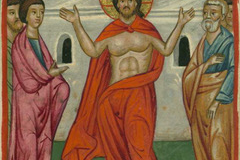Caritas delegation visits Darfur
The ACT/Caritas programme in Nyala, Southern Darfur welcomed an international Caritas delegation last week. The representatives from across Europe came to show support for the emergency team working in the region, see the situation and report back to their members. The Nyala programme is the first joint operation between the Caritas international network and its Protestant equivalent Action by Churches Together (ACT). It is aiming to help 500,000 people displaced by the conflict in the Darfur region of West Sudan. Alistair Dutton, ACT/Caritas Emergency Programme Manager, emphasised the urgency of the situation: "The population in the displaced camps is very fragile but the trigger point for the crisis in Darfur is the rains. Currently people can sleep outside but as the rains, which have already started, get heavier this will change sparking a massive health crisis. We could be facing a death toll of hundreds of thousands of people." ACT/Caritas is responding to the crisis with local partners, the Sudan Council of Churches (SCC), Sudo and Sudanaid. The partners have been providing thousands of displaced people with shelter, proper sanitation, clean water, health care, seeds and tools and essential items such as blankets and soap. To date around 50,000 displaced people have been helped by the partners. Delegate, Margaret Ann McShane, from Caritas Scotland (SCIAF) said: "It was inspiring to witness the dedication of the field staff in Nyala. Their determination and commitment are helping to transform the lives of some of the most vulnerable people in Darfur." Under the ACT/Caritas Programme, 60 volunteers have been trained to help Sudo and SCC with assessing needs and distributing items. They will eventually be based in three regional offices in Al Geneina, Zalingei and Nyala, supported by mobile emergency response teams. "Our current response is 1% of what it should be and we are working very hard to scale up," explained Alistair Dutton. "In the next few weeks, significant numbers of new staff will arrive and there will be more local staff recruited in each of the three bases." During their stay the delegation visited Kalma, Belil and Dirage Camps. 80,000 people are based in Kalma which is an official government camp. Its proximity to Nyala (30 minutes drive) means it has attracted support from lots of NGOs. It has food and sheeting distribution, a health clinic, school, wells and a thriving market. The hand pump provided by SCC was very busy as women and children collected water. The government is trying to discourage more people from settling in Kalma as it sprung up spontaneously and staff there are unable to cope with any more arrivals. The shelters are built in close proximity to each other constituting a health risk and some were built in wadis or river beds, meaning they might be swept away when the rains come. A short fifteen-minute drive from Kalma is Belil camp where Sudo distributed plastic sheeting. Around 8,000 people from five different tribes live in the camp, some in makeshift shelters. Sultan Abdullah Munwal, head of one of the tribes, said: "People were here for four months before Sudo brought sheeting. We need water, food, clothes, mosquito nets and a health centre. At home we were farmers but we don't have seeds, security or a place to plant here. Before our village was attacked, I had cows, money and goats. Now, I have nothing." The delegation heard similar stories from other refugees. Nearly all had fled with nothing or just a few cooking pots. Some were collecting grass to cook and eat. A planned trip to Mershing camp the following day was cancelled because the road was deemed unsafe due to an earlier security incident.


















